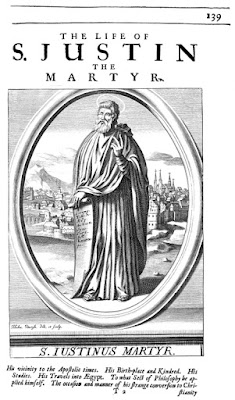ST. JUSTIN MARTYR (JUNE 1ST)
Edited by Bp. Joseph (Ancient Church of the West)
The Life of St. Justin Martyr
St. Justin Martyr was born around AD 100 at Flavia Neapolis (today Nablus) in Samaria. He self-identified as a Samaritan. His family may have been pagan, since he was uncircumcised, and defined himself as a Gentile. His grandfather, Bacchius, had a Greek name, while his father, Priscus, bore a Latin name, which has led to speculations that his ancestors may have settled in Neapolis soon after its establishment or that they were descended from a Roman "diplomatic" community that had been sent there.
Most of St. Justin Martyr’s works are lost, but two apologies and a dialogue did survive. The First Apology, his most well-known text, passionately defends the morality of the Christian life, and provides various ethical and philosophical arguments to convince the Roman emperor, Antoninus, to abandon the persecution of the Church. Further, he also indicates, as St. Augustine would later, regarding the "true religion" that predated Christianity, that the "seeds of Christianity" (manifestations of the Logos acting in history) actually predated Christ's incarnation. This notion allows him to claim many historical Greek philosophers (including Socrates and Plato), in whose works he was well studied, as unknowing Christians.
In the opening of the Dialogue, St. Justin describes his early education, stating that his initial studies left him unsatisfied due to their failure to provide a belief system that would afford theological and metaphysical inspiration to their young pupil. He says he tried first the school of a Stoic philosopher, who was unable to explain God's being to him. He then attended a Peripatetic philosopher but was put off because the philosopher was too eager for his fee. Then he went to hear a Pythagorean philosopher who demanded that he first learn music, astronomy, and geometry, which he did not wish to do. Subsequently, he adopted Platonism after encountering a Platonist thinker who had recently settled in his city.
Some time afterwards, St. Justin chanced upon an old man, possibly a Syrian Christian, in the vicinity of the seashore, who engaged him in a dialogue about God and spoke of the testimony of the prophets as being more reliable than the reasoning of philosophers. Moved by the aged man's argument, Justin renounced both his former religious faith and his philosophical background, choosing instead to re-dedicate his life to the service of the Divine. His newfound convictions were only bolstered by the ascetic lives of the early Christians and the heroic example of the martyrs, whose piety convinced him of the moral and spiritual superiority of Christian doctrine. As a result, he thenceforth decided that the only option for him was to travel throughout the land, spreading the knowledge of Christianity as the "true philosophy." His conversion is commonly assumed to have taken place at Ephesus though it may have occurred anywhere on the road from Syria Palestina to Rome.
St. Justin Martyr then adopted the dress of a philosopher himself and traveled about teaching. During the reign of Antoninus Pius (138–161), he arrived in Rome and started his own school. Tatian was one of his pupils. In the reign of Marcus Aurelius, after disputing with the cynic philosopher Crescens, he was denounced by the latter to the authorities, according to Tatian (Address to the Greeks 19) and Eusebius (HE IV 16.7–8). St. Justin was tried, together with six companions, by the urban prefect Junius Rusticus, and was beheaded. Though the precise year of his death is uncertain, it can reasonably be dated by the prefectoral term of Rusticus (who governed from AD 162 and 168).
The Martyrdom of St. Justin Martyr
The Martyrdom of St. Justin preserves the court record of the trial:
The Prefect Rusticus said: Approach and sacrifice, all of you, to the gods.
St. Justin said: No one in his right mind gives up piety for impiety.
The Prefect Rusticus said: If you do not obey, you will be tortured without mercy.
St. Justin replied: That is our desire, to be tortured for Our Lord, Jesus Christ, and so to be saved, for that will give us salvation and firm confidence at the more terrible universal tribunal of Our Lord and Saviour.
And all the martyrs said: Do as you wish; for we are Christians, and we do not sacrifice to idols.
The Prefect Rusticus read the sentence: Those who do not wish to sacrifice to the gods and to obey the emperor will be scourged and beheaded according to the laws.
The holy martyrs glorifying God betook themselves to the customary place, where they were beheaded and consummated their martyrdom confessing their Saviour.
 |
| A Gothic Depiction of the Martyrdom of St. Justin |
 |
| A later mosaic of the Martyrdom of St. Justin |
 |
| Relics of St. Justin and other early Church martyrs can be found in the Jesuit's Church in Valletta, Malta. |
Collect for St. Justin Martyr
ALMIGHTY GOD, by whose grace and power Thy holy Martyr Justin taught Thy divine philosophy, triumphed over all suffering, and despised death; Grant, we beseech Thee, that enduring hardness, and waxing valiant in fight, we may with the noble army of martyrs receive the crown of everlasting life; through Jesus Christ our Lord, Who liveth and reigneth with Thee, in the Unity of the Holy Ghost, ever One God, world without end. Amen.
(Text modified from Wikipedia, the Orthodox Missal and the 1928 Book of Common Prayer)





Comments
Post a Comment